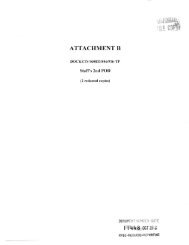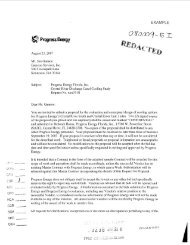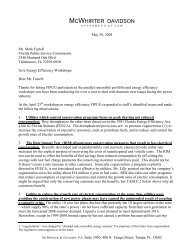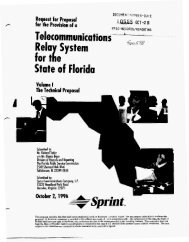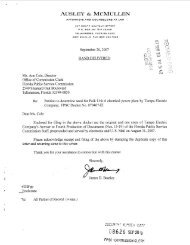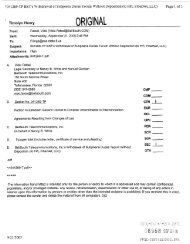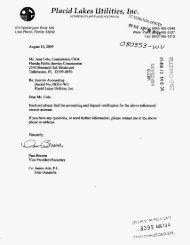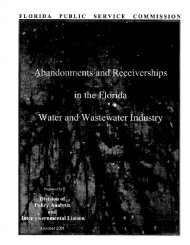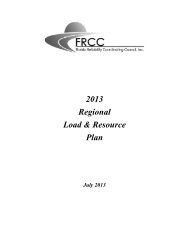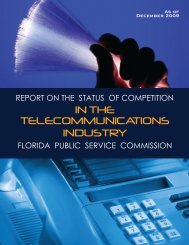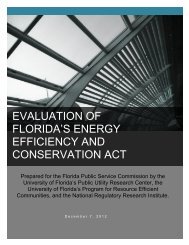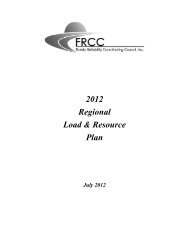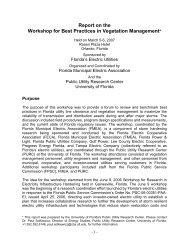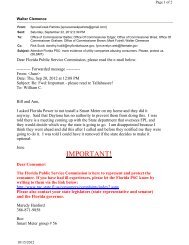11897-08.pdf - Public Service Commission
11897-08.pdf - Public Service Commission
11897-08.pdf - Public Service Commission
You also want an ePaper? Increase the reach of your titles
YUMPU automatically turns print PDFs into web optimized ePapers that Google loves.
12/29/20088:36:32 AMlage 1 of 1<br />
Ruth Nettles<br />
From:<br />
Sent:<br />
Cooper, Roberta G [Ea] [Roberta.G.Cooper@Embarq.com]<br />
Friday, December 26,2008 3:12 PM<br />
To: Filings@psc.state.fl.us<br />
cc: Susan Masterton<br />
Subject: 070699 EQ Response to Motion for Reconsideration<br />
Attachments: 070699 EQ Response to Motion for Reconsideration 12-26-<strong>08.pdf</strong><br />
Filed on Behalfof: Susan S. Masterton<br />
Senior Counsel<br />
Embarq Florida, Inc.<br />
1313 Blair Stone Road<br />
Tallahassee, FL 32301<br />
Telephone: 850/599-1560<br />
Email: susan.masterton@embarq.com<br />
Docket No. - 070699<br />
Title offiling:<br />
Filed on behalf08 Embarq<br />
No of pages: 20<br />
Embarq Florida. Inc.'s ResDonse In OpDOSitiOn To Intrado Communications. Inc.'s<br />
Motion For Reconsideration<br />
Description: Embara Florida. Inc.'s Response In 0-Qposition To Intrado Communications, Inc.'s<br />
Motion For Reconsideration<br />
Roberta G. Cooper<br />
Legal Specialist<br />
EMBARQ<br />
Voice: 850-599-1 563 I Fax: 850-878-0777<br />
Email: Roberta.G.Cooper@embarq.com<br />
1313 Blair Stone Road ITallahassee, Florida 32301<br />
Mailstop: FLTLH00201<br />
Voice 1 Data I Internet 1 Wireless 1 Entertainment<br />
This e-mail is the pmpcny of EMBARQ and may contain confidentid and privileged material for the sole use of the intended<br />
wecipient(s). kiny review, use, distribution or disclosure by others is strictly prohibited. If you are not the intended<br />
recipient (or authorized to receive for the recipient), please contact the sender and delete all copier of the m e w L, u ,- h .<br />
~ ~ .. ! . I hh:nEf:it--cn:r<br />
,<br />
12/29/2008<br />
I1897 OEC29g<br />
FPSC - COMMISSION CLERK
Voice Data Internet Wireless Entertainment<br />
I I 1 . I EMBARQ"<br />
December 26,2008<br />
FILED ELECTRONICALLY<br />
Ms. Ann Cole<br />
Tallahassee, FL 32349-0850<br />
Re: Docket NO. 070699-TP<br />
Dear Ms. Cole:<br />
matter.<br />
ease find Etnbatq Fl<br />
tions Inc.'s Motion<br />
Copies are being served on the parties in this docket pursuant to the attached certificate of<br />
service.<br />
If you have any questions regarding this electronic filing, please do not hesitate to call me<br />
at (850) 599-1560.<br />
Sincerely,<br />
Is/ Susan S. Mssterton<br />
Susan S. Mostenon<br />
Enclosure<br />
..- .-<br />
i<br />
w<br />
0<br />
m<br />
a<br />
LL
CERTIFICATE OF SERVICE<br />
DOCKET NO. 070699-TP<br />
I HEREBY CERTIFY that a true and correct co y of the foregoing was served by<br />
regular U.S. Mail and efectronie mail on this & day of December, 2008 to the<br />
following:<br />
Florida <strong>Public</strong> <strong>Service</strong> <strong>Commission</strong><br />
d Oak Blvd.<br />
Taliahasseq FC 323994850<br />
It&,me.state.fl.vs<br />
Florida <strong>Public</strong> <strong>Service</strong> <strong>Commission</strong><br />
Division of Competitive Markets & Enforcement<br />
Michael Barrett<br />
2540 Shumard Oak Blvd.<br />
Tallahassee, FL 32399-0850<br />
tnbrrrrett~~sc,state.~.~s<br />
Intrado Communications Inc,<br />
Rebecca Ballesteros<br />
160 I Dry Creek Drive<br />
Longmont, CO 80503<br />
Rebecca.BallcsterosC&tntrado.com<br />
Messer Law FLrm<br />
Floyd Self<br />
2618 Centennial Place<br />
Taltahnssae, FL 323.08<br />
fself@lnwfla.com<br />
Cahill Law Firm<br />
Ch6rie R. Kiser<br />
Luke Nikas<br />
1990 K Street, N.W., Suite 950<br />
Washington, DC 20096<br />
ekiser@cmdc.com<br />
-/SI Susan S. Masterton<br />
Susan S. Masterton
BEFORE THE FLORIDA PUBLIC SERWCF. COMMISSION<br />
In re: Petition by lntrado Communications. Inc. for Arbitration<br />
of Certain Rates, Terms, and Conditions for Interconnection and<br />
Related Arrangemints with Embarq Florida, Inc., pursuant to<br />
Section 252(B) of the Communications Act of 1934,<br />
ils Amended, and Section 364.162, F.S.<br />
Docket NO. a70699-TP<br />
EMBARQ FLORIDA. lNC.’S RESPONSE IN OPPOSITION<br />
TO INTRADO COMMUNICATIONS, 1NC.S<br />
MOTION FOR RECONSIDERATION
TABLE OF CONTENTS<br />
1 . INTRODUCTION ............................................................................................................. 1<br />
I1 . STANDARB FOR MOTION RECONSIDERATION . 2<br />
I11 . ARGUMENT ., .................................................................... ....n.<br />
IV .<br />
3<br />
A . Intrado’s service is not “telephone exchange” ........... . . ,..+...<br />
I . DeJnition qf ‘Wepho ange .. does not mpprt reconsideralion ......................... 4<br />
2 . Advanced <strong>Service</strong>s Order does not support reconsideradton .......................................... 7<br />
3 . DA Call Complerion Order does not s reconsideration ....................................... 9<br />
4 . Slate commission decisions are consistent with the <strong>Commission</strong>’s Order ................... t0<br />
does nac apply M Intrudo ’s 91 1/E91 I service ...................................... 11<br />
8 . Intrado is not precluded from competing under c0mmercSal arrangements . 12<br />
C. Intrado did not pursue its state law claims ........... ......-.................................. 14<br />
CONCLUSION . .....”..... . 15<br />
I<br />
.. i.....”............................
BEFORE THE FLORIDA PUBLIC SERVICE COMMISSlON<br />
in re: Petition by Intrado Communications, Inc.<br />
for arbitration of certain sates, terms, and<br />
conditions for onnection and related<br />
arrangements Florida, Inc.,<br />
pursuant to 2(b) of the<br />
Communications Act of 1934, as amended, and<br />
Section 364.162, F.S.<br />
DOCKET NO. 0?0699-TP<br />
Filed: December 26,2008<br />
EMBARO FLORIDA. INC.’S RESPONSE IN OPPOSITION<br />
TO INTRADO COM.MUNICATIONS. INC.’S<br />
MOTION FOR RECONSIDERATION<br />
Embarq Florida. Inc. (“Embarq”), in accordance with Rule 25-22.060, F.A.C., hereby<br />
files its Response in Opposition to the Motion for Reconsideration C‘Motion”) of Order No.<br />
PSC-08-0799-FOF-TP (“Order”) filcd by lntrado Communications, Inc. (“lntrado”) on<br />
December 18, 2008.’ lntrado has presented no valid grounds for thc <strong>Commission</strong> to reconsider<br />
its Order and, therefore, Intrado’s Motion should hc denid.<br />
1. INTRODUCTION<br />
lntrado seeks reconsideration of the <strong>Commission</strong>‘s ruling that the 91 I/EYI 1 services it<br />
proposes to offer IO <strong>Public</strong> Safety Answcring Points (“PSAPs”) in Florida is not telephone<br />
exchange scrvice and thereforc is not subjcct to $251(c) of the Telecommunications Act.<br />
lntrado makes no new arguments and offers no new evidence to support its rcquest for<br />
reconsideration. but merely reiterates the arguments in its Post-hearing Bricf relating to its<br />
interpretation of FCC precedent and its need for $251 interconnection in order to compete.<br />
i<br />
Enibarq has tiled separaceIy i& Response in Opposition to t<br />
Embarq’s Kesponse was due wiihin 7 dayq or by December<br />
%yJ, Embq‘s Response is due on the at ‘*Be end of the next day w<br />
holiday” m aeeordarree with Rule 28-106.103. F.A.C. Embarq has Gied<br />
I Argument this stme day.<br />
t a Sanuday, Sunday. or lcgai<br />
y its Response in Opposition to<br />
2
Intrado's Motion wholly fails to meet the standard for reconsidaation, that is, Intrado fails to<br />
identify a point of fact or iaw that the <strong>Commission</strong> overlooked or failed to consider in reaching<br />
its decision. In addition, Intrado is wrong in its inte ation of the relevant FCC precedent and<br />
is wrong in its assertion that it can only compete tbugh interconnection arrangements under<br />
$251(c). Intrado's Motion provides no cognizable basis for the <strong>Commission</strong> to reconsider its<br />
decision and should be denied.<br />
11. STANDARD FOR MOTION F R RECONSlDERATlON<br />
As the <strong>Commission</strong> has recognized consistently in its numerous rtilings on Motions for<br />
Remnsidetation, the standard for granting rwnsideration is that the Motion must identify a<br />
point of fact or law that the Comission overlooked or failed to consider in rendering its Order.<br />
See, Stewart Bonded Warehouse v. Bevis, 294 So. 2d 31 5 {Ra. 1 ; Diamond Cab Co. v. King,<br />
146 So. 2d 889 (Fla. 1962); Pingree v Quainfance, 394 So. 2d 162 Fla. 1" DCA 1981). Tho<br />
<strong>Commission</strong> has held that it is not a sufficient basis for a Motion For Reconsideration that the<br />
Movant merely believes that a mistake was made, not is it appropriate for the Movant to reargue<br />
the same points of fact or law that were considered in the original ruling, See, Stewart Bonded<br />
Warehouse, 294 So. 2d at 3 1 State ex. rel. Jaytex Rea Green, 105 So. 2d 817 (Fla. 1"<br />
DCA 1958).<br />
Intrado's Motion implies that because the <strong>Commission</strong> di ally discuss in the<br />
Order every piece of evidence or every argument presented by Intrado, thea it must have<br />
overlookcd this evidence or thesc ents. More reasonably, the Cmission considered all of<br />
theevidence offered by both parties in reaching its conclusions, but discussed only the evidence<br />
and arguments most relevant to support its conclusion..' Of course, once the <strong>Commission</strong> reached<br />
See, Jayex RSu& at<br />
mititenant prophry in<br />
L<br />
ver of terrier of last resort<br />
bury Flordu. Inc., Od5r No.
the conclusion that #251(c) did not apply to lntrado’s 91UE911 service (as required to resolve<br />
Issue 1) then it was unnecessary for the <strong>Commission</strong> to consider OT discuss the remaining nine<br />
issues regarding the applicability of $251 to specific intcrconnection provisims.<br />
Intrado’s Motion for Reconsideration does no more than reargue the positions it advanced<br />
through its testimony and evidence asld the arguments in its Post-hearing Brief. In rendering its<br />
decision the <strong>Commission</strong> fully considered and weighed the evidence and arguments presented by<br />
both Intrado and Embarq. Therefore, Intrad s Motion should be denied.<br />
Ilk ARGUMENT<br />
A. Intrado’s seYvEee is not “telephone excbng?’’<br />
Intrado makes no new arguments to support its position that the <strong>Commission</strong>’s Order was<br />
incorrect in ruling that intrado’s service does not meet ephone exchange<br />
service’’ set forth in the Tele cations Act. Rather, Intrado repeats the same arguments<br />
that it made in its Post-he Brief, where Inttado relied extensively on the Advanced <strong>Service</strong>s<br />
Order‘ and the DA Call Compfettorn &der5 to support its position that its 91 lE911 service to<br />
PSAPs is telephone exchange service subject to interconn&ction under $251 [e). (See, e.g., pages<br />
9-10 and 13 of Intrado’s Post-hearing Brief.) In fact, Intrado repeats many of<br />
it made in its Post.bearing brief almost verbatim. re, for instance, the arguments on page 9<br />
of Intrado’s Post-hearing Brief, regarding the relevance of the Advanced <strong>Service</strong>s Order with<br />
page 8 of its Motion, where Intrado discusses the Adtranced <strong>Service</strong>s Ode to support its request<br />
for Reconsideration. Again, compare the discussion of the DA Completion Order on page IO of<br />
POF-TL issued Aug. 3,2007, at<br />
“we considued, either exphcitly<br />
of Wireline Sclr<br />
‘ ~eaiomwr~<br />
where the <strong>Commission</strong><br />
Uy, each ofthe item o<br />
. -<br />
Cion for Reconsideration, stamg that<br />
ilm. 15 FCC Rcd 385 (1999)<br />
Infomarion under thr Telecommunieatiom Act of !934, RP Amended, 16 FCC Rcd<br />
2736 (2001) (”DA Call Completjon Order”).<br />
3
Intrado’s Post-hearing Brief with the same discussion on page 9 of Intrado’s Motion. And,<br />
finally, compare the discussion of Intrado’s ability to “hook flash” calls on page 12 of its Post-<br />
heanng Brief, with the same discussion on page 8 of its Motion.<br />
In its Motion Intrado primaril lies on the Advanced Senices Order and the DA Call<br />
Completion Order (the same two orders that underlie similar arguments in Intrado’s Post-hearing<br />
Brief), statmg that the <strong>Commission</strong> overlooked factual evidence that was presented in the case<br />
and that the <strong>Commission</strong> did not fully consider the services that lntrado intends to provide in<br />
Florida. Intrado focuses on the statutory definition of telephone exchange service, treating<br />
two parts of the definition separately and claiming that Intrado’s service meets both! As<br />
discussed in detai1 below, lntrado errs in its interpretation of the definition of “telephone<br />
exchange service” and these FCC orde<br />
1. The definition of“telephone exclrange ” does noi support recansidermtion.<br />
The federal statutes define Wephoneexchanga service” in 47 U.S.C. $1 53 as follows:<br />
(47) Telephone exchange service<br />
The term “telephone exchange service” means (A) service within a<br />
telephone exchange, or within a connected system of telephone exchanges<br />
within the same exchange area operated to fumish to<br />
intercommunicating service of the chara<br />
single exchange, and which is co<br />
(B) comparable service provided through a system of switches,<br />
transmission equipment, or other facilities (or combination thereon by<br />
which a subscriber can originate and terminate a telecommunications<br />
service.<br />
lntrado itself app” to acknowledge that its service does not meet paragraph A of the<br />
hangc. On page IO, In<br />
not hmited to semcw that must be praddcd over the<br />
which discusses the definition of<br />
4
The definition of telephone exchange service was modified by the Telecommunications<br />
of 1996 to add subparagraph (B), which lists the characteristics of a service that would be<br />
comparable to the original definirion included in subparagraph (A)? ln the advanced <strong>Service</strong>s<br />
Order, fhe FCC defined comparable to mean that “...the services retain the key characteristics<br />
and qualities of the telephone exchange definition under subparagraph (A).”’ For that reason thc<br />
FCC determined that subparagraph (B) also encompassed the “intercommunication”<br />
characteristic contained in subparagraph [A)? Intrado’s petition incorrectly imptiff that the two<br />
subparagraphs are when they are not, but simply amplify one another. This fwt is<br />
significant in that it indicates that the definition of “intercommunication“ is essentially the same<br />
as “origination and termination”.<br />
According to the FCC, “intermmunication” refas to a service that “permits a<br />
communityof interconnected customers to make calls to ope another over a switched<br />
The FCC reiterated this concept in the DA Call Completion order at 71’7 by stating that<br />
intercommunication allows customem to make calls to one another. When customem call one<br />
another that means that customer A can call customer B and similarly customer B can call<br />
customer A, which is origination and termination.<br />
There is no dkpute that Intrado intends to provide services to <strong>Public</strong> fety Answering<br />
Points (PSAPs) in Florida. Intrado witness Spence-Less filed Inttada’s Florida price list with her<br />
direct testimony (Hearing Exhibit 17, Exhibit CSL-4 filed April 21, 2008) which was<br />
fiibsequcntly revised (Hearing bit 26, Exhibit CSL-4 filed July 8, ZOOS). The services were<br />
discussed and described at length throughout the proceeding. There should be no dispute that the<br />
’ In Ihe Matt#r uf Federal Sate JaiM Boa<br />
31).<br />
I<br />
Universal Smtcv, 13 FCC Rcd 11501 (1996) (-’Steve= Repon’?<br />
5
fa 9-1-1 call is the end user that dials 9-1-1. Intrado's price list validates this when it<br />
describes the E9-1-1 trunks that it provides as part of its service offering:<br />
E9-1-1 Tuks<br />
The trunks that connedt &om the end office sewing the individual<br />
telephone that originates a 9-1-1 cat1 to the E$l-l Selective Router.<br />
(Exhibit CSL4,2nd Revised Sheet 12, Page 13 of 55) {Emphasis Added)<br />
These end-user origi calls are terminated to PSAPs sewed by Intrado, which means<br />
that Intrado's services meet the terminating aspeet of intercommunication. However, the<br />
description of intrado's services in its tariff does not show that Intrado's smices can be used to<br />
originate calls, because they cannot. It is this aspect of Intrado's service m relation to the<br />
statutory definition of telephone exchmge service that the <strong>Commission</strong> correctly addressed in its<br />
order. The <strong>Commission</strong> properly found that the services that lntrado provides do not give their<br />
customers (PSAPs) the ab to originate calls, that is, to "intercommunicate," with the end<br />
users dialing 9-1-1.<br />
Inttado states that it provides such intercommunication via its "hook flash" option. This<br />
is a direct reference to the manual transfer option that is contained in Intrado's price list,<br />
Manual Transfer<br />
A PSAP call taker may transfer an incoming, call manually by depressing<br />
the hook switch of the associated telephone or the "add" button on<br />
oved Customer telephone system, and dialing either an a<br />
n or 10 digit telephonenumber. (Exhibit CSL4,3"' Revise<br />
Page 47 of 55)<br />
This optional feature is listed in Intrado's tariff along with two other transfer options,<br />
Fixed Transfer and Selectiv a11 Transfer. In each case these options allow the PSAP to take<br />
the call originated by the 9-1-1 caller and forward it to another AP or Emergency Responder,<br />
as necessary. The originating point ofthe call is the end user making the call and the terminating<br />
6
point is not the intermediate connection provided by Intrado, but the ultimate terminating point,<br />
be it another PSAP or Emergency Responder.<br />
Some of these calls wil1 be forwarded ma inter-selecttve routing between PSAPs and<br />
some will be fmatded over telephone lines furnished to the PSAP by another LEC, not Intrado.<br />
These lines will also be used to call the 9-1-1 call originator back should the call be dropped.<br />
This configuration is apparent in Intrado's Revised Price List.<br />
5.2.3 Intelligent Emdtgency Network Smice is not intended as a total<br />
for the local telephone servic various public safety<br />
ch may participate in the use ervice. The Customer<br />
must subscribe to additional local change services for purposes of<br />
ministratwe outgoing ca and for receiving other calls.<br />
Page 51 of55)<br />
h the Company its agreement to the<br />
[Emphasis Added)<br />
o local exchange service at the PSAP<br />
for placing oatping cat&, and<br />
, I* Revised Sheet SO, Pa<br />
This call transfer option does not equate to call origination as included in the definition of<br />
telephone exchange service, but is<br />
nuation of the same call."<br />
2. The Advanced <strong>Service</strong>s Ordm does nor support reconsideration.<br />
The FCC determined in the Advanced <strong>Service</strong>s Order that ILEC xDSL based services are<br />
telephone exchange and subsequently order& ILECs to unbundle those facilities." Intrado<br />
argues that this proves that non-traditional senices can be charactenzed BS telephone exchange<br />
services, (See, 1ntrado"s Motion at page 12) While this maybe true,'' the FCC did not determine<br />
khat xDSL based services were telephone exchange because they were non-traditional but<br />
It See, Heanng Exhibtt 8, Hicks Depsi<br />
%npiatcs" these calls bot merely that th<br />
that is, that it orrginntes from the snd u~jer dialing 9 I 8 .<br />
A6vmced Sertlcea Order 81 78.<br />
" Advanced <strong>Service</strong>s Order a1317<br />
7<br />
he u ngt saying thac r<br />
anga the name of the
ecaiqe they provided the intercommunication that was essential and met the other crit<br />
contained in the statutory definition. As the FCC found, “Rather, the key criterion for<br />
determining whether a service fdls within the scope of the telephone exchange service definition<br />
is whether it permits “intercomm~nication”,1~<br />
xDSL senlces @low the customer (the purchaser of the xDSL service) to “originate”<br />
communications. These communications can be in the form OF queries to Internet websites, work<br />
at home access ompany networks, or placing a VoIP call. xDSL services can also be used to<br />
receive communications (‘’terminate’? itiated by ather “callers”. Instmt messaging services as<br />
well as calls are examples of xDSL services that meet these criteria. Clearly, Intrado’s<br />
91 1/E911 service does not.<br />
Subsequent to the Advanced ces Order the FCC eliminated the ILEC obligation to<br />
unbundle advanced services’s and de-classified ILEC xDSt as telecommunications seryice in thc<br />
ILEC Broadband 0rder.l6 In that decisian the FCC determined that ILEC broadband Intemet<br />
access service, including its transmission component, is an rmation service and that the<br />
transmission component‘ ich is xDSL) is not a tel mmunications sen ” The ECC<br />
ocket Nos. 95-2<br />
pd3rd.r.’)<br />
ILEC Bmadbmd Order at lj5.<br />
8
eiterated that information swvices and telecommunication services were mutually exclusive,<br />
even though information services are provided via telecommunications, noting that it had not<br />
been entirely wnsistent on the matter.” This issue is relevant given the confirsing discussion of<br />
infomation services in the Advanced Serjices Order and the fact that the statutory definition of<br />
telephone exchange service explicitly refers to the origination and termination of a<br />
telecommunication’s service, therefore excluding information services. Importantly, today’s<br />
xDSL services offered by lLECs such as<br />
3. The DA Call Complerwn Order does n& support reconsideration.<br />
arq do not qualify as telephone exchange services.<br />
In the DA Call Completion Order the issue addressed by the FCC was whether or not<br />
competing director<br />
ssistance providers should get access to<br />
databases. The FCC fomd that some DA call completion services did qualify as telsphone<br />
exchange service but not all, an important distinction which Intrado failed to address in its<br />
Motion. The FCC found that in order for the call completion service to be classified as telephone<br />
exchaoge service the DA provider had to compl call on its own f acilities and not merely<br />
hand the call off for completion.lg The FCC also found that the DA provider had Io charge the<br />
caller for completing that call.” Intrado’s services do not meet those two criteria.<br />
when end users originafe a call to a DA provider, they ask for the telephone number of<br />
the party that they want to call. If the DA provider offers call completion the DA provider offers<br />
to complete the call for the end user and charges the end user for that call completion service.<br />
When an end user dials 9-1-1 and is connected to a PSAP and the PSAP forwards that call to<br />
another PSAP or an Emergency Responder, neither the PSAP nor Intrado bills the end user for<br />
completing that call. Unlike the call completion found by the FCC to be telephone exchange<br />
I’ ILEC Broadband Order e1 footnotes 32 and 3211.<br />
l9 DA Call Completion Order at 115 and 722.<br />
DA Call Completion Order at 722.<br />
9
.<br />
service, Intrado’s 9111E911 service does not meet the “charge” requirement included in the<br />
definition of telephone exchange service. While Intrado may “charge” the PSAP for the call<br />
forwarding capability, that is not the s8me as the end user charge contemplated by the FCC in the<br />
an D.4 Call Completiori Order.<br />
Furthermore, lntrado does not complete these forwarded calls over its own facilities but,<br />
in fact, hands them off for completion, thus failing to meet the other key requirement. This is<br />
true when Intrado uses inter-selectiv<br />
when the 91-1-1 call is forwarded over telepbne lines secured from another local exchange<br />
provider.<br />
4. Recent state commission dgct<br />
ing to another carrier’s facilities and is equal<br />
tu are consistent with the Comm<br />
In an attempt to further support its position regarding the nature of its 91 1031 1 servim,<br />
Intrado discussed to the decisions of two other state <strong>Commission</strong> decisions that Intrado says<br />
found that its services were, indeed, telephone exchange. These decisions wee issued in 2001,<br />
which appears to predate Intrado’s 91 ]E911 service to PSAPs which is the subject of t<br />
arbitration. Far more relevant to the <strong>Commission</strong>‘s Order in this arbitration are the very recent<br />
decisions by two ofher <strong>Commission</strong>’s that are consistent with the <strong>Commission</strong>’s ruling that<br />
$25 I(c) does not apply to Intrado’s /E91 1 service. 21<br />
In a similar arbitration between Embarq and Iatrado in Ohio, the Ohio <strong>Commission</strong> found<br />
that $25 1 (a), and not Sl(c), applies when fntrado is the 91 I service provider and when Intrado<br />
and Embarq each serve a different PSAP and transfer calls between each other.” The Ohio<br />
‘’ Of course, other sate Mmmlsion decisions ara not brnding on this <strong>Commission</strong> In any event, though they may be<br />
mstrucuve.<br />
In the Mam @the Petition af Intra& Cammwricat~ons, Inc /or Arbitration ojlnrerconnection. Ram Term,<br />
and Condinons and Rel#icd AwngL.mentv with United Telephone Gwnp” a/ #hi@ d6a Embarq and United<br />
Telephone Company Embarqz firsum to 2SJ@) of the Telemmunrcatrons Acl of 1996,<br />
CaseNo. 07-1216-TP- n Award issued Sept 8 (Ohio Arbitration AWprd) a1 page E.<br />
10
<strong>Commission</strong> subsequently upheld its original decision that 525 1 (c) does not apply to Intrado’s<br />
91 1/E91 I service in its Entry ruling on Intrado‘s Request for Rel1earing.2~<br />
In an arbitration between Intrado and Verizon in West Virginia, the West Virginia<br />
<strong>Commission</strong> reached a similar conclusion.“ In denying Intrado’s request that Verizon<br />
th Inh’ado under 5251Cc) the Arbitration Award found that §251(c) does not apply<br />
to fnh’ado’s request for interconnection when Intrado is the I liE911 service provider to a PSAP<br />
on cannot be required to intermnnect on Intrado’s network, as there is no legal<br />
requirement for them to do so.’ss<br />
5. Section 2Sl(c) does not tppb ti3 Inirado ‘s<br />
mission’s detennination that Intrado’s service does not meet the definition of<br />
“telephone exchange” traffic because it cannot be used to ate a call is a mfficient. basis,<br />
standing alone, for the <strong>Commission</strong>’s futding thar 5251(c} does not apply to the interconnection<br />
Intrado is requesting with Embarq. Neve ess, in its testimony and Post-hearing Brief Embarq<br />
enumerated sevetal additional characteristics of Intrado’s 91 LIE91 1 sorvice that support that<br />
conclusion as well. As stated in Embarq‘s Post-hearing Brief, and recognized by the <strong>Commission</strong><br />
in its Order:<br />
Embarq believes that these 9111E911 emergency services are not local<br />
telephone exchange d ces, but rather are unique services that do not fall<br />
into the categories contemplated under section<br />
Embarq’s position is based on the unique chara<br />
enumerated by Embarq’s witness James M. Map1<br />
These characteristics include: 1) the requirements of federal law that<br />
?’ Ohia Arbitration Award. Enny on Rehearing, issued<br />
Infrudo Communlcutiuns, Inc and Verrzon West Vi irfbn for ArLurrulton, Carre No. 08-0298-T-PC.<br />
Arbitration Award, entered Nov. 14,2008 PWVA Arbitration Award“). The Arbmator’s deoisron was affirmed by<br />
the West Virginla Commlsston on Dec. 16,2008.<br />
‘ WVA Arbitration Awnrd at to argue specifically the issue of<br />
25i(c) agreement is Arbitrator noted chat<br />
applicable pmvislom CC’s des promulgst<br />
would indicate that Intra ht IO reqws~ m(treonnecuon solefy for the provision of 9 1<br />
toSenion25l(c) may be questionable.“ WVA Arbitranon Award at page 10<br />
11
user access to 9<br />
Network as “separate fro<br />
ST””); 3) the exclusive n<br />
eline E91 I Netwo<br />
one-way nature of rhe tramc, i.e., it flows ouly<br />
dials 91 1 to the PSAP who will provide the 91 I service; 4) the fact that<br />
911 traffic is jurisdi~tionally agnostic, the fact that intercarrier<br />
not apply to 91 1 s e; and 6) the funding of<br />
and the Wireline E etwotk through end user<br />
surcharges. &e, Embarq‘s Post-hearing Brief page 4? footnotes omitted;<br />
Order at page 2).<br />
*<br />
In addition, as Embarq previously argued in its testimony and Brief, the specific<br />
interconnection arrangements requested by lntrado are not governed by $25l(c). lntrado is<br />
requesting that Embarq establish a point of interconnection (POI) on its network (i.e.* at<br />
Intrado’s selective router) for termination of Embarq’s end user 911 calls to PSAPs sewed by<br />
Intrado. However, as Embarq argued in its Post-hearing Brief, &251 applies to interconnection<br />
by a competitive carrier within an ILEC’s, Le., Embarq’s, network. Interconnection on a<br />
competing carrier’s network, such as Intrado is requesting, is governed by $25l(a). (Sea,<br />
Embarq’s Post-hearing Brief et pages 13-17,)<br />
B. Intrado is nut prerluded from competing under rommercial arrangements<br />
Like Intrado’s reargument that its 91 1/E911 service is telephone exchange s<br />
lnfrado’s reiteration of‘ its claim that it ranno ompete without an interconnection agreement<br />
under $25 I(c) offers nothing new. Inst , Intrado re-advances the very same arguments it raised<br />
in its Post-hearing ado’s Post-hearing Brief at pages 3 and 6-8) Contrary to<br />
Intrado’s assertions, the <strong>Commission</strong> did not fail to consider Intrada’s arguments on this point,<br />
rather the <strong>Commission</strong> rejected htrado’s position in favor of Embarq’s countervailing<br />
arguments. Intrado’s proffer of the contracts it has now entered into with PSAPs also raises no<br />
new evidence. Embarq presented evidence regarding Intrado’s relationships with PSAPs in<br />
12
Embarq’s territory at the hearing. (Hearing Transcript at 177; Hearing Exhibit 50) The fact that<br />
tntrado has now formally entered into contracts with PSAPs does nothing to alter the evidence<br />
on which the <strong>Commission</strong> based its decision and pro es no gtounds for reconsiderati~n?~<br />
The issue of whather interconnection under<br />
l(c) is the only viable method for Intrado<br />
to enter the competitive 911 market was fully addressed by both parties in their pre-filed<br />
monies and briefs. As Embarq previously has stated, it is<br />
ing and able to make the<br />
interconnec~on services Intrado has requested available under a commercial arrangement. In<br />
fact, Embarq has entered into just such an arrangement with a competitive 911 provider in<br />
Indiana and provided a copy of that agreement as evidence in the proceeding. (Set?, Hearing<br />
Exhibit No. 43.)<br />
In addition, as stated in pre-filed testimony, Maples Deposition, a<br />
ef, Embarq has voluntarily agreed to the majority of the terms Inwado has<br />
requested in the context of a commercial agreement. Specifically, Embarq has aped to 1)<br />
cstablish po1nts of interconnection on Intrado’s network @me 2) provide direct end office<br />
tmking where end offices are sewed by a single Intrado-served PSAP (Issue 2 ) not charge for<br />
the use of hbarq’s selective router to route Embarq’s end user 91 1 calls to an Inttado-saved<br />
PSAP in split wire centers (Issue 2); and 4) establish for inter-seleotive routing (Issue 4). In<br />
addition, the only dispute related to several other terms proposed by Intrado was whether a ZSl(c) or<br />
a commercial agrement is ate. These atkenvise undisputed terms include Intrado’s<br />
ordcring processes (Issue 5) and access to lntrado’s databases (Issue 6):’<br />
’’ lntrado does not identify the PSAPs with which 11 has entered into convactr IO provide its 91 I’E911 hen’izc. so it<br />
IS no1 evident from Intrado’s Motion whether these contracts are even factually relevant to Intrado’s interconneclion<br />
with Embarq.<br />
’’ Clearly, the testinwny and evidence in the record show that Embarq has (MI ‘kbufled” Intrado’s request for<br />
interconmction UJ Intrado alleges ai page 13 of its Morion. It is also clear ihai the commercial agreement terms<br />
proposed by kmbarq are not “draconian” as lntrado assens at page 14 of its Motion<br />
13
Intrado is flatly wrong in stating at page 18 of its Motion that there is no evidence to<br />
support the <strong>Commission</strong>'s "suggestion" that Intrado can g the interconnection it needs to<br />
compete through a commercial arranganent with Embarq. To the contrary, Embarq produced<br />
copious evidence demonstrating commercial arrangement is readily available and provides<br />
a viable mechanism for Intrado to compete to deservices to PSAPs in Florida.<br />
C lntrado did not pursue Its state law claims<br />
Inttado argues in its Motion that the <strong>Commission</strong> wed in not considering Intrado's<br />
request far interconnection separately under ss. 364.16, 364.161 and 364.162, F.S.,<br />
notwithstanding the <strong>Commission</strong>'s determination that 825 l(c) of the Telemmmunications Act<br />
does not apply to Intrado's 91 1/E9 I1 services. However, as Embarq argued in it$ Motion to<br />
Dismiss (subsequently withdrawn after the parties reached agreement on the issues to be<br />
arbitrated}, at no time during Intrado's negotiations with Embarq did lrttrado state or ewn<br />
suggest that it intended the negotiations to be govemed by the negntraticln and arbitmtion<br />
provisions of ss. 364,16, 364.161 and 364.162, Rather, all of Intrado's communications with<br />
Embarq indicated that Intrado was negotiating under the procedures and parameters of $8251<br />
and 252 of the federal Act. (See, Embarq's Motion to iss, filed on December 17, 2007, at<br />
Page 6).<br />
In addition, while Intrado's initial ay have appeased to rely on state law, as<br />
well as fedcral law, to support its interconnection request, Intrado did not propose separately any<br />
issues related to this claim w separately pursue this claim in its pre-filed testimony or Post-<br />
hearing Brief. 28 lntrado cannot now, through a Motion for Reconsideration, essentially request<br />
LL Secnon 363.162, F.S., has been cited in p s arbitration decisions to support the<br />
authority 10 resolve arbitration disputes unde lecommunioations Aot. See, e.&, In<br />
DJ~~IU~ Nctwurk, Im. for urhicrarion cf' certarn tevw and cvnditions ofpropmd her<br />
14
that the <strong>Commission</strong> start over and reinsert issues and arguments related to she applicabili<br />
meaning of the state statutes into the arbitration.<br />
N. CQNCLUSION<br />
of fact or law thai the Commissiun overlooked or tailed<br />
ado's 911/E911 service to PSAPs is not"telephone exchange"<br />
S . The Commimon's determination that the interconnection arrangements Intrado is<br />
requesting should be established in a commercial apement is fully consistent with Act and the<br />
FCC decisions interpreting the Act (as well as the recent<br />
commissions), and is fully supported by the evidence and arguments in the record. In addition,<br />
the record clearly shows that Embarq is ready a able to enter into a commercial agreement<br />
with Intrado that will provide a viable mechanism for Intrado to compete to provide its 91 1/E911<br />
service to PSAPs in Florida. Finally, Intrado cannot now go back and attempt to arbitrate its<br />
claims separately under state law, when it did not raise these issues separately at the pmedurally<br />
appropriate time during the arbitration or address them in its testimony and briefs.<br />
WHEREFORE, for the reasons set forth in this Response, the Cam<br />
Intrado's Request for Reconsideration.<br />
hio and West V<br />
sion should deny
Respectfully submitted this 26' day of December 2008.<br />
Jsl Susan. S. Mastertan<br />
Susan S. Masterton, Esq.<br />
Tallahassee FL 32301



